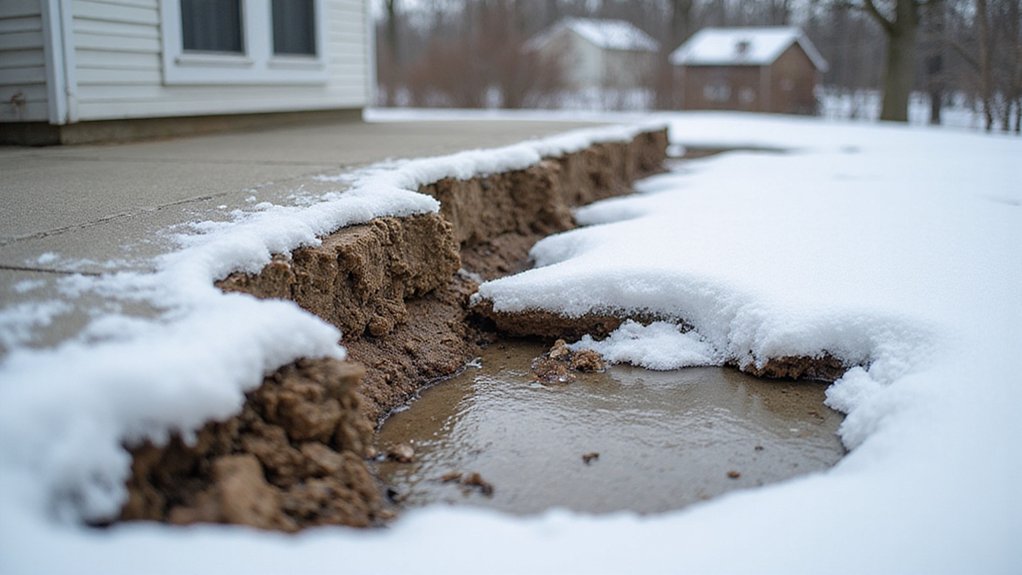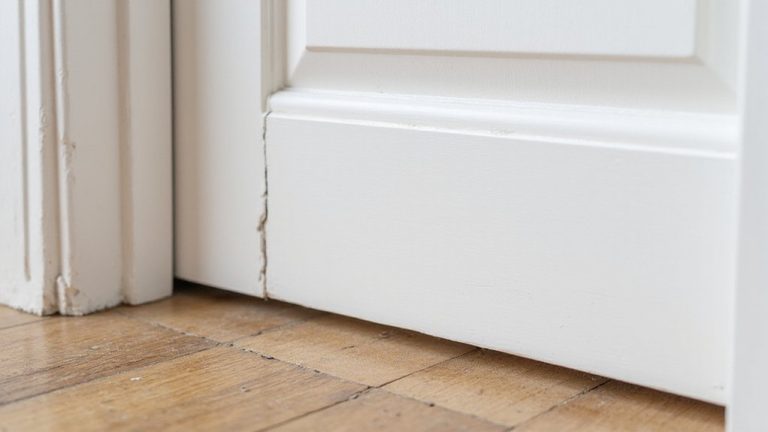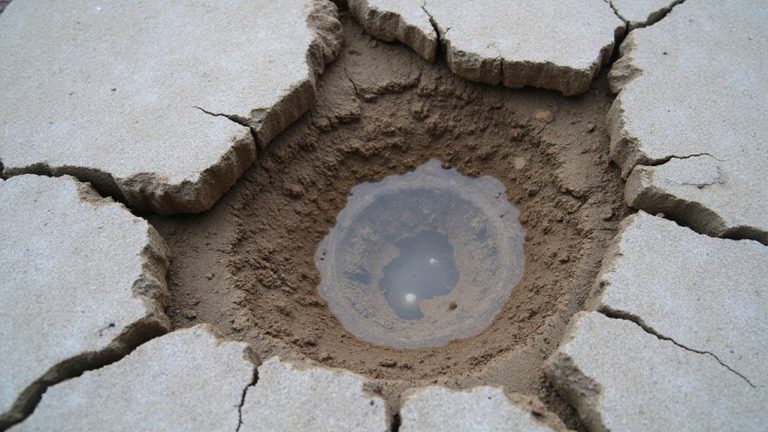You might not realize it, but Michigan's unique climate can silently wreak havoc on your home's foundation. The dramatic seasonal shifts—from freezing winters to humid summers—create a perfect storm of soil movement and structural stress. As temperatures fluctuate, the ground beneath your home expands and contracts, potentially causing unseen damage that could compromise your property's stability. Curious about how these environmental factors might be impacting your home right now?
The Winter Freeze-Thaw Cycle's Impact on Foundation Stability
In many cold regions, the winter freeze-thaw cycle can wreak havoc on home foundations, causing potentially serious structural damage. When temperatures drop and rise repeatedly, soil expansion and contraction create intense foundation freeze-thaw pressures that challenge your home's structural integrity.
You'll notice these cycles push against your foundation walls, creating tiny cracks that can gradually widen. Expanding and contracting soil puts immense stress on concrete and masonry, potentially compromising your home's stability. Expansive soils in Detroit's climate can accelerate foundation damage through repeated seasonal shifts.
Understanding these natural processes helps you protect your most prized possession and prevent costly repairs down the road.
Soil Moisture and Foundation Movement in Michigan
Throughout Michigan's varied terrain, soil moisture plays a critical role in foundation movement and potential structural challenges. When groundwater levels fluctuate, your home's foundation can experience significant stress changes that might compromise its stability. Clay-rich soils, common in many Michigan regions, are especially prone to expanding and contracting with moisture variations. These shifts can cause your foundation to crack, settle, or become misaligned, potentially leading to costly repairs. Understanding how soil moisture impacts your home's structural integrity can help you proactively protect your most prized possession and maintain your property's long-term value. Foundation repair experts recommend regular inspections to identify early signs of soil-related foundation damage before significant structural issues develop.
Identifying Early Warning Signs of Climate-Induced Foundation Damage
Most homeowners will encounter subtle yet critical signs of climate-induced foundation damage before serious structural problems develop. Seasonal temperature fluctuations and ground settling patterns can create early indicators you'll want to recognize.
Watch for hairline cracks in your walls, uneven floors, or doors that suddenly stick or won't close smoothly. These symptoms might signal foundation stress caused by Michigan's dramatic temperature shifts. Pay attention to your home's exterior and interior surfaces, noting any unusual shifts or separations.
Seasonal Ground Expansion and Contraction Risks
Because Michigan's climate can dramatically impact your home's foundation, understanding seasonal ground expansion and contraction risks is paramount for safeguarding your property. Soil composition changes causing frost heaving effects can create significant stress on your foundation's structural integrity.
As temperatures fluctuate, the ground beneath your home will expand and contract, potentially creating microscopic cracks or more severe structural shifts. These seasonal movements can gradually compromise your foundation's stability, leading to potential water infiltration and long-term damage.
Monitoring these subtle changes and addressing them proactively can help protect your home's foundation from climate-induced wear and potential costly repairs.
Drainage and Water Management Strategies
While soil movement can create foundation challenges, proper water management becomes your first line of defense against potential structural damage. Effective gutter maintenance helps redirect rainwater away from your home's foundation, preventing soil saturation and erosion. You'll want to guarantee downspouts extend at least four feet from your house, creating a strategic water dispersal zone.
Regular soil aeration can also improve drainage, reducing hydrostatic pressure that might compromise your foundation's integrity. By implementing these proactive strategies, you're safeguarding your most significant investment and maintaining your home's structural health.
Types of Foundation Damage Common in Michigan Homes
When Michigan's unique climate challenges homeowners, foundation damage becomes a critical concern for property owners across the state. Your home's foundation can suffer from various issues due to extreme weather conditions:
- Soil erosion caused by heavy rainfall and snowmelt
- Frost heaving that pushes foundation walls and creates significant structural stress
- Freeze-thaw cycles that weaken concrete and create cracks
These climate-related challenges can compromise your home's structural integrity, leading to potentially expensive repairs. Understanding the types of foundation damage specific to Michigan's environment helps you proactively protect your most prized possession and maintain your home's long-term stability.
Preventative Maintenance for Long-Term Foundation Protection
Since Michigan's challenging climate poses unique risks to home foundations, proactive maintenance becomes your best defense against potential structural damage. You'll want to prioritize moisture control by ensuring proper drainage around your home's perimeter and keeping gutters clean.
Regular temperature regulation through insulation and weatherproofing helps prevent extreme expansion and contraction that can stress foundation walls. By scheduling annual professional inspections, you can catch early signs of potential issues before they become costly repairs. Your diligence in maintaining your foundation will protect your home's structural integrity and give you peace of mind.
Professional Assessment and Repair Options for Michigan Homeowners
After taking proactive steps to protect your home's foundation, understanding professional assessment and repair strategies becomes the next vital component of extensive foundation care.
Michigan homeowners can guarantee their foundation's integrity by:
- Scheduling a professional home inspection annually to detect early warning signs
- Developing an all-encompassing repair plan with certified foundation specialists
- Investing in targeted repairs that address specific climate-related structural challenges
Frequently Asked Questions
How Expensive Are Foundation Repairs in Michigan's Harsh Climate?
Foundation repair costs in Michigan can range from $2,000 to $30,000, depending on damage severity. You'll want to get multiple quotes from trusted foundation repair contractors to manage your expenses effectively.
Can Foundation Issues Affect My Home's Resale Value?
Foundation issues can substantially lower your home's sale price, potentially reducing market value by 10-15%. Addressing problems early helps protect your investment and maintain your property's desirability for future buyers.
Does Homeowners Insurance Cover Climate-Related Foundation Damage?
Most homeowners insurance policies won't cover climate-related foundation damage. You'll likely pay out-of-pocket for repairs, which can substantially impact your home's value and protect your investment's long-term cost.
When Is the Best Time to Check My Foundation?
You'll want to schedule professional evaluations in spring and fall, undertaking proper seasonal inspections when weather changes can expose potential foundation shifts before major damage occurs.
What Warning Signs Indicate Urgent Foundation Repair Needs?
You'll want to watch for diagonal wall cracks, uneven floors, sticking doors, and sudden soil erosion around your foundation. These warning signs suggest potential structural damage that needs immediate professional assessment.



